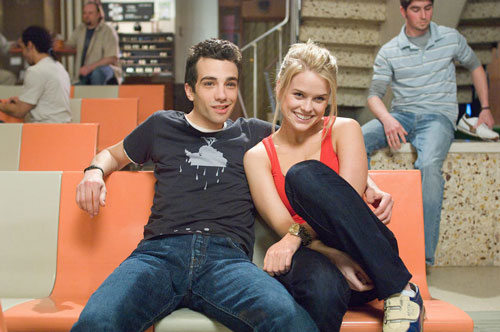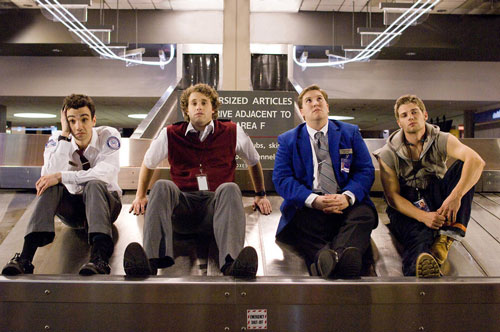She’s Out of My League (Dreamworks)
The Stab: Funnier than you might think with potentially good intentions and a duo of charming leads, but the humor is furiously forced and misses more than it hits, before the narrative concludes in complete disarray.
The film opens on a scrawny, squirmy guy speaking directly into the camera. He presents a silver heart-shaped box to an unknown party in a lame attempt to convey his affection. His plea is pathetic, his image slimy and sleazy, and the overall effect is uncomfortably repulsive. Sure, we feel sorry for him, but God save whoever is on the receiving end of this display. This is Kirk, our protagonist and the one whose causes we’re supposed to champion in this film. Thankfully, Kirk redeems himself on the nerdy charms of his awkwardness and good-natured demeanor, but the opening scene casts a bitter shadow over his character throughout.
Kirk (Jay Baruchel) lives shrouded in self-doubt and social surrender. He yearns for his trash-diva ex-girlfriend (intended recipient of the opening address) while constantly patronized and pummeled by his cantankerous family clan. He works as an airport security guard, where he can safely balance on the precipice of escape and keep his ambitions of becoming a pilot tangibly within reach.
It is here at his job that he meets her. Molly (Alice Eve) enters the terminal to an adulating procession: neat and supple from her soft yellow locks, to her generous cleavage, to her long, silken legs atop deadly stilettos. Every male she passes falls into a lustful stupor, physically unable to keep their jaws in place. When we pan back, the whole seems lesser than the sum of its parts. She’s as ripe as a peach but not quite a knock-out in the asserted literal sense.
As Molly makes her way through airport security, Kirk (who is curiously less affected by her paralyzing beauty) saves her from the attempts of a lascivious coworker to fabricate grounds for a strip search. Thanks to Kirk, she and we are spared her untenable sexual humiliation. Oh, how terribly fine is the line between comedy and tragedy!
Molly goes on her way, set to become but a porcelain memory in Kirk’s cerebral stores, when she leaves her iPhone behind. She calls it, he answers it, and she arranges for him to return it to her at a party she is catering. It doesn’t seem to cross either of their minds that the normal and appropriate course of action would have her returning to the airport to retrieve her forgotten phone— but perhaps she’s just that entitled by her captivating looks, and/or he’s just that much of a doormat.
Allegedly, they hit it off at the party and begin to date—at first unbeknownst to Kirk himself, who cannot imagine that a girl like Molly would be interested in a boy like him. And neither can we. Yes, he’s a nice guy, but his clumsy awkwardness can be off-putting, just as he occasionally borders on socially inept. She, on the other hand, is a complete vision (her looks only improve throughout the film): intelligent, confident, and never missing a beat. He is shackled by either insecurity or a lack of talent and ambition (the film goes back and forth on which is the main issue). She is a successful party planner with clear-minded goals, her head on perfectly straight.
She is and remains, from a fully qualitative standpoint, completely and utterly out of his league. When the film later tries to assert that Kirk has just as much to offer—the entire point and purpose of the story, perhaps—someone is seriously kidding themselves. Kirk earns extra due for putting up with nearly constant misfortune and for not parading his prize around for social kudos, but is the best Molly can do merely someone who is not a dog? The math doesn’t add up, and so Molly’s motives are suspicious. Though she eventually admits to aiming low, the film doesn’t convince us that she’d want to stay there.
Kirk is just as confounded by the backwards logic, and he partakes in long discussions with his fruit basket of friends and airport security colleagues, theorizing the forces in play and scrutinizing the details of his relationship. Stainer (T.J. Miller) brings to mind a specific feminine hygiene product, unable to speak without a sarcastic tone, his entire lexicon a dollar-bin joke book. (Molly has her own version, named Patty, who is equally unpleasant.) Devon (Nate Torrence) is a marshmallow puff with the idealistic romantic zeal of a Disney princess. (He is also quite fond of Disney, which is played at one point for a modest laugh.) Jack (Mike Vogel) is suspiciously handsome dead air.
The quartet’s conversations know no bounds, but they are played solely for laughs. And are they ever so intent on drawing laughs. Every joke is a sledgehammer over the head, insistently smashing down until you feel something. While that feeling is a cautious amusement a surprising amount of the time, it more often—particularly with repeated assaults—more so resembles nausea. At the very least, Kirk and his friends provide a convincing thesis as to why we continue to have crises of national security.
Wholly unexpected (and regrettably unforgettable) are the moments of crude gross-out humor, played to some success for sheer disbelief and numbing shock. Bare butts prove an aperitif for a later scene of testicular cosmetology, and nothing will prepare for Molly’s pet dog and its inexplicable penchant for slurping the male seed. I would trade all of these moments in a heartbeat for one particular extended, uninterrupted tracking shot of Molly and Kirk walking along a street together, just talking and getting to know each other. It’s a huge breath of fresh air from the film’s suffocating attempts at comedy and may yet provide a glimpse at why either of them is actually putting up with all of this.
The final act takes a nosedive into narrative chaos and near incomprehensible idiocy as the film pulls out all of the stops to bring us some generically enlightening and fulfilling rom-com conclusion. But it’s so poorly staged and begins under such puzzling circumstances (our focal couple fights because Kirk is unimpressed by Molly’s self-described “physical defect”?) that really, we just want it to stop.




Directed by Jim Field Smith. Written by Sean Anders & John Morris.
Rated R for language and sexual content.
Runtime is 1 hour, 44 minutes.
Tickets & Showtimes» Watch the Trailer» Visit the Website»







Leave a Reply
You must be logged in to post a comment.